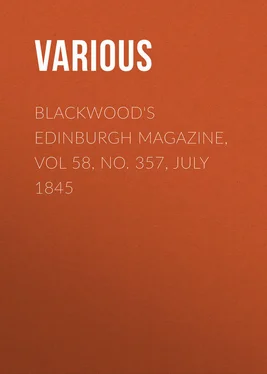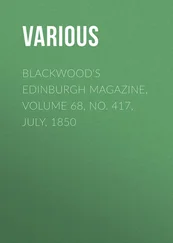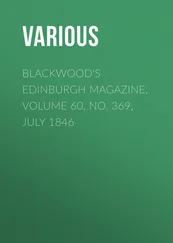Various - Blackwood's Edinburgh Magazine, Vol 58, No. 357, July 1845
Здесь есть возможность читать онлайн «Various - Blackwood's Edinburgh Magazine, Vol 58, No. 357, July 1845» — ознакомительный отрывок электронной книги совершенно бесплатно, а после прочтения отрывка купить полную версию. В некоторых случаях можно слушать аудио, скачать через торрент в формате fb2 и присутствует краткое содержание. Издательство: Иностранный паблик, Жанр: periodic, foreign_edu, Путешествия и география, на английском языке. Описание произведения, (предисловие) а так же отзывы посетителей доступны на портале библиотеки ЛибКат.
- Название:Blackwood's Edinburgh Magazine, Vol 58, No. 357, July 1845
- Автор:
- Издательство:Иностранный паблик
- Жанр:
- Год:неизвестен
- ISBN:нет данных
- Рейтинг книги:3 / 5. Голосов: 1
-
Избранное:Добавить в избранное
- Отзывы:
-
Ваша оценка:
- 60
- 1
- 2
- 3
- 4
- 5
Blackwood's Edinburgh Magazine, Vol 58, No. 357, July 1845: краткое содержание, описание и аннотация
Предлагаем к чтению аннотацию, описание, краткое содержание или предисловие (зависит от того, что написал сам автор книги «Blackwood's Edinburgh Magazine, Vol 58, No. 357, July 1845»). Если вы не нашли необходимую информацию о книге — напишите в комментариях, мы постараемся отыскать её.
Blackwood's Edinburgh Magazine, Vol 58, No. 357, July 1845 — читать онлайн ознакомительный отрывок
Ниже представлен текст книги, разбитый по страницам. Система сохранения места последней прочитанной страницы, позволяет с удобством читать онлайн бесплатно книгу «Blackwood's Edinburgh Magazine, Vol 58, No. 357, July 1845», без необходимости каждый раз заново искать на чём Вы остановились. Поставьте закладку, и сможете в любой момент перейти на страницу, на которой закончили чтение.
Интервал:
Закладка:
Upon Churchill's return to London, the brilliant reputation which had preceded, and the even augmented personal advantages which accompanied him, immediately rendered him the idol of beauty and fashion. The ladies of the palace vied for his homage – the nobles of the land hastened to cultivate his society. Like Julius Cæsar, he was carried away by the stream, and plunged into the vortex of courtly dissipation with the ardour which marks an energetic character in the pursuit whether of good or evil. The elegance of his person and manners, and charms of his conversation, prevailed so far with Charles II. and the Duke of York, that soon after, though not yet thirty years of age, he obtained a regiment. In 1680 he married the celebrated Sarah Jennings, the favourite lady in attendance on the Princess Anne, second daughter of the Duke of York, one of the most admired beauties of the court, and this alliance increased his influence, already great, with that Prince, and laid the foundation of the future grandeur of his fortunes. Shortly after his marriage he accompanied the Duke of York to Scotland, in the course of which they both were nearly shipwrecked on the coast of Fife. On this occasion the Duke made the greatest efforts to preserve his favourite's life, and succeeded in doing so, although the danger was such that many of the Scottish nobles perished under his eye. On his return to London in 1682, he was presented by his patron to the King, who made him colonel of the third regiment of guards. When the Duke of York ascended the throne in 1685, on the demise of his brother, Churchill kept his place as one of the gentlemen of the bedchamber, and was raised to the rank of brigadier-general. He was sent by his sovereign to Paris to notify his accession to Louis XIV., and on his return he was created a peer by the title of Baron Churchill of Sandbridge in the county of Hertford – a title which he took from an estate there which he had acquired in right of his wife. On the revolt of the Duke of Monmouth, he had an opportunity of showing at once his military ability, and, by a signal service, his gratitude to his benefactor. Lord Feversham had the command of the royal forces, and Churchill was his major-general. The general-in-chief, however, kept so bad a look-out, that he was on the point of being surprised and cut to pieces by the rebel forces, who, on this occasion at least, were conducted with ability. The general and almost all his officers were in their beds, and sound asleep, when Monmouth, at the head of all his forces, silently debouched out of his camp, and suddenly fell on the royal army. The rout would have been complete, and probably James II. dethroned, had not Churchill, whose vigilant eye nothing escaped, observed the movement, and hastily collected a handful of men, with whom he made so vigorous a resistance as gave time for the remainder of the army to form, and repel this well-conceived enterprise.
Churchill's mind was too sagacious, and his knowledge of the feelings of the nation too extensive, not to be aware of the perilous nature of the course upon which James had adventured, in endeavouring to bring about, if not the absolute re-establishment of the Catholic religion, at least such a quasi-establishment of it as the people deemed, and probably with reason, was, with so aspiring a body of ecclesiastics, in effect the same thing. When he saw the headstrong monarch break through all bounds, and openly trample on the liberties, while he shocked the religious feelings, of his people, he wrote to him to point out, in firm but respectful terms, the danger of his conduct. He declared to Lord Galway, when James's innovations began, that if he persisted in his design of overturning the constitution and religion of his country, he would leave his service. So far his conduct was perfectly unexceptionable. Our first duty is to our country, our second only to our benefactor. If they are brought into collision, as they often are during the melancholy vicissitudes of a civil war, an honourable man, whatever it may cost him, has but one part to take. He must not abandon his public duty for his private feelings, but he must never betray official duty. If Churchill, perceiving the frantic course of his master, had withdrawn from his service, and then either taken no part in the revolution which followed, or even appeared in arms against him, the most scrupulous moralist could have discovered nothing reprehensible in his conduct. History has in every age applauded the virtue, while it has commiserated the anguish, of the elder Brutus, who sacrificed his sons to the perhaps too rigorous laws of his country.
But Churchill did not do this, and thence has arisen an ineffaceable blot on his memory. He did not relinquish the service of the infatuated monarch; he retained his office and commands; but he employed the influence and authority thence derived, to ruin his benefactor. So far were the representations of Churchill from having inspired any doubts of his fidelity, that James, when the Prince of Orange landed, confided to him the command of a corps of five thousand men, destined to oppose his progress. At the very time that he accepted that command, he had, if we may believe his panegyrist Ledyard, signed a letter, along with several other peers, addressed to the Prince of Orange, inviting him to come over, and had actually concluded with Major-General Kirk, who commanded at Axminster, a convention, for the seizure of the king and giving him up to his hostile son-in-law. James was secretly warned that Churchill was about to betray him, but he refused to believe it of one from whom he had hitherto experienced such devotion, and was only wakened from his dream of security by learning that his favourite had gone over with the five thousand men whom he commanded to the Prince of Orange. Not content with this, it was Churchill's influence, joined to that of his wife, which is said to have induced James's own daughter, the Princess Anne, and Prince George of Denmark, to detach themselves from the cause of the falling monarch; and drew from that unhappy sovereign the mournful exclamation, "My God! my very children have forsaken me." In what does this conduct differ from that of Labedoyere, who, at the head of the garrison of Grenoble, deserted to Napoleon when sent out to oppose him? – or Lavalette, who employed his influence, as postmaster under Louis XVIII., to forward the Imperial conspiracy? – or Marshal Ney, who, after promising at the court of the Tuileries to bring the ex-emperor back in an iron cage, no sooner reached the royal camp at Melun, than he issued a proclamation calling on the troops to desert the Bourbons, and mount the tricolor cockade? Nay, is not Churchill's conduct, in a moral point of view, worse than that of Ney; for the latter abandoned the trust reposed in him by a new master, forced upon an unwilling nation, to rejoin his old benefactor and companion in arms; but the former abandoned the trust reposed in him by his old master and benefactor, to range himself under the banner of a competitor for the throne, to whom he was bound neither by duty nor obligation. And yet such is often the inequality of crimes and punishments in this world, that Churchill was raised to the pinnacle of greatness by the very conduct which consigned Ney, with justice, so far as his conduct is concerned, to an ignominious death.
"Treason ne'er prospers; for when it does,
None dare call it treason."
History forgets its first and noblest duty when it fails, by its distribution of praise and blame, to counterbalance, so far as its verdict can, this inequality, which, for inscrutable but doubtless wise purposes, Providence has permitted in this transient scene. Charity forbids us to scrutinize such conduct too severely. It is the deplorable effect of a successful revolution, even when commenced for the most necessary purposes, to obliterate the ideas of man on right and wrong, and leave no other test in the general case for public conduct but success. It is its first effect to place them in such trying circumstances that none but the most confirmed and resolute virtue can pass unscathed through the ordeal. He knew the human heart well, who commanded us in our daily prayers to supplicate not to be led into temptation, even before asking for deliverance from evil. Let no man be sure, however much, on a calm survey, he may condemn the conduct of Marlborough and Ney, that in similar circumstances he would not have done the same.
Читать дальшеИнтервал:
Закладка:
Похожие книги на «Blackwood's Edinburgh Magazine, Vol 58, No. 357, July 1845»
Представляем Вашему вниманию похожие книги на «Blackwood's Edinburgh Magazine, Vol 58, No. 357, July 1845» списком для выбора. Мы отобрали схожую по названию и смыслу литературу в надежде предоставить читателям больше вариантов отыскать новые, интересные, ещё непрочитанные произведения.
Обсуждение, отзывы о книге «Blackwood's Edinburgh Magazine, Vol 58, No. 357, July 1845» и просто собственные мнения читателей. Оставьте ваши комментарии, напишите, что Вы думаете о произведении, его смысле или главных героях. Укажите что конкретно понравилось, а что нет, и почему Вы так считаете.












